Contents
Guide

The author and publisher have provided this e-book to you for your personal use only. You may not make this e-book publicly available in any way. Copyright infringement is against the law. If you believe the copy of this e-book you are reading infringes on the authors copyright, please notify the publisher at: us.macmillanusa.com/piracy. CONTENTS This book is dedicated to Suzie and Bill ACKNOWLEDGMENTS I want to thank the editors at Farrar, Straus and Giroux, especially Elisheva Urbas, and the designer, Cynthia Krupat. I am grateful for the advice and encouragement I have received from many friends and colleagues.
I especially thank my wife, Anne Ferry, and also Frank Bidart and Robert Pinsky, friends in the art, Dimitri Hadzi, and William L. Moran. I wish also to express my gratitude to the Ingram Merrill Foundation for a grant and an award. INTRODUCTION According to Sumerian tradition, Gilgamesh was an early ruler of the city-state of Uruk, biblical Erech, and the evidence, admittedly meager and indirect, puts him there around the twenty-seventh century B.C.E . Of his actual achievements we know nothing except what is perhaps reflected in the later traditions of him as heroic warrior and builder of his citys mighty walls. For the Sumerians, and later for the Assyrians and Babylonians, Gilgamesh was both god and hero.
As the former, he appears in a god-list about a century after his death, and he continued to be worshipped for another two thousand years, until the end of the Assyro-Babylonian civilization. He was an underworld deity, a judge there and sometimes called its king. His statues or figurines appear in burial rites for the dead, and his cult was especially important in the month of Ab (JulyAugust), when nature itself, as it were, expired. As hero, Gilgamesh undoubtedly lived on in the oral traditions of the Sumerians, especially at the court of Uruk. When these traditions were first committed to writing is not known. The earliest compositions we have, five or six, probably do not go back further than the late third millennium B.C.E .
Though they are sometimes poorly preserved, we can identify in them themes and tales that will later be integrated in the Babylonian epic. Thus, in one lay, we find Gilgamesh, along with Enkidu and other retainers, striving to achieve the immortality of fame by the slaying of the monster Huwawa (see below, Tablets IVV). In another, we read of the royal oppression of Uruk (see below, Tablet I). In another, the goddess Inanna unleashes the Bull of Heaven upon Gilgamesh and Enkidu (see below, Tablet VI). In still others, Enkidu is trapped and must remain in the underworld (see below, Tablets VIIVIII), and Gilgamesh resents his own mortality (see below, Tablets IXXI). These compositions in Sumerian, or similar ones, written or oral, in the Sumerian or the Babylonian languages, were the sources for the Babylonian composition that followed in the early second millennium B.C.E ., what is known as the Old Babylonian period.
This epic is not a translation of a Sumerian original. It is, rather, a highly selective and creative adaptation and transformation of what we find in the earlier works. It is still known only in fragments, but it was certainly a work of at least one thousand lines, perhaps much longer, focused on a central theme, mans mortality. It begins with Gilgameshs exhausting his people with the labors of the corve and introduces a very new Enkidu, not the retainer of the Sumerian tradition, but a hairy Wild Man, created by the gods to match Gilgameshs enormous energies, eventually humanized, and Gilgameshs beloved friend and companion in his adventures. He joins Gilgamesh in his quest for the immortality of fame, an old Sumerian theme, but then the text goes its own highly original way: Enkidu is punished for his part in the death of Huwawa and dies. Consumed with grief, Gilgamesh reacts by rejecting the heroic ideals of the past and, in effect, rejects his humanity.
He will be content now only with the true immortality of the gods. He therefore journeys to the end of the world to find the one immortal man, the Babylonian Noah, Utnapishtim, and to learn from him the secret of his unending life. In the centuries that followed, knowledge of the epic spread across the ancient Near East, not only in its Babylonian form but also in versions written in the Elamite, Hittite, and Hurrian languages. Recent discoveries indicate that the epic had assumed more or less its standard form by the thirteenth century B.C.E . The standard version of eleven tablets (with a twelfth as an appendix, a later and poorly integrated addition and, unlike the rest of the epic, a literal translation into Babylonian from a Sumerian original) is a work of about three thousand lines and is known mainly from the Nineveh recension on tablets of the seventh century B.C.E . Babylonian tradition credited it to a poet-editor by the name of Sin-leqe-unninni, Sin (the moon god), accept my plea.
It is this relatively late, standard text, with occasional assistance from the Old Babylonian version, that is the basis of the poem by David Ferry that follows. And let it be stated at once: it is David Ferrys poem. It is not Sin-leqe-unninnis or anyone elses, any more than The Vanity of Human Wishes is Juvenals and not Johnsons. He has given us, not a translation, not at least as that term is ordinarily understood, but a transformation. He does not compete, therefore, with the earlier translators, whose contribution to his own work he generously acknowledges, nor should his work be compared with theirs. He has given us what they have not and what as authors of word-for-word translations they could not aspire to.
He has given us a work of verbal art. He has thereby communicated to us some sense of the beauty of the original and some sense of the emotions that reading or hearing the original must have aroused. In this respect, however free his version on one level may be, on another and deeper one it seems remarkably faithful to the original. It is, therefore, a major contribution to our understanding and appreciation of this ancient and moving poem. WILLIAM L. MORAN the Andrew W.
Mellon Professor of the Humanities, Emeritus, Harvard University Brunswick, Maine GILGAMESH TABLET I The Story of him who knew the most of all men know; who made the journey; heartbroken; reconciled; who knew the way things were before the Flood, the secret things, the mystery; who went to the end of the earth, and over; who returned, and wrote the story on a tablet of stone. He built Uruk. He built the keeping place of Anu and Ishtar. The outer wall shines in the sun like brightest copper; the inner wall is beyond the imagining of kings. Study the brickwork, study the fortification; climb the great ancient staircase to the terrace; study how it is made; from the terrace see the planted and fallow fields, the ponds and orchards. This is Uruk, the city of Gilgamesh the Wild Ox, son of Lugalbanda, son of the Lady Wildcow Ninsun, Gilgamesh the vanguard and the rear guard of the army, Shadow of Darkness over the enemy field, the Web, the Flood that rises to wash away the walls of alien cities, Gilgamesh the strongest one of all, the perfect, the terror.
It is he who opened passes through the mountains; and he who dug deep wells on the mountainsides; who measured the world; and sought out Utnapishtim beyond the world; it is he who restored the shrines; two-thirds a god, one-third a man, the king. Go to the temple of Anu and Ishtar: open the copper chest with the iron locks; the tablet of lapis lazuli tells the story. There was no withstanding the aura or power of the Wild Ox Gilgamesh. Neither the fathers son nor the wife of the noble; neither the mothers daughter nor the warriors bride was safe. The old men said: Is this the shepherd of the people? Is this the wise shepherd, protector of the people? The gods of heaven listened to their complaint. Aruru is the maker of this king.


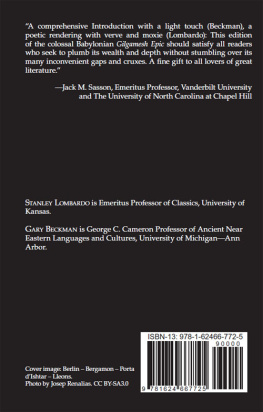
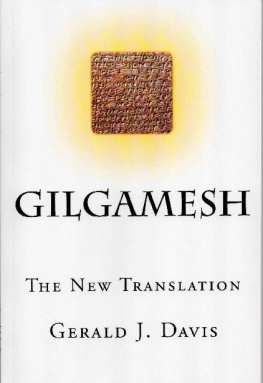
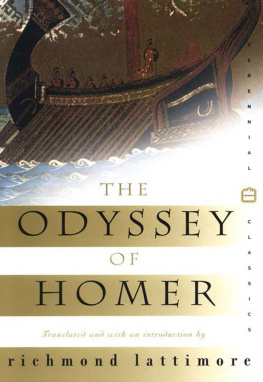
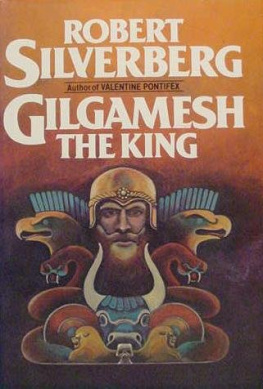
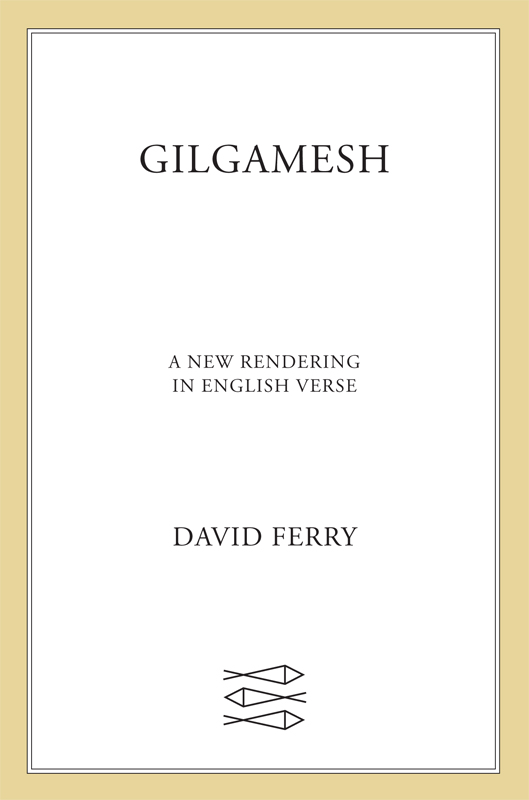
 The author and publisher have provided this e-book to you for your personal use only. You may not make this e-book publicly available in any way. Copyright infringement is against the law. If you believe the copy of this e-book you are reading infringes on the authors copyright, please notify the publisher at: us.macmillanusa.com/piracy. CONTENTS This book is dedicated to Suzie and Bill ACKNOWLEDGMENTS I want to thank the editors at Farrar, Straus and Giroux, especially Elisheva Urbas, and the designer, Cynthia Krupat. I am grateful for the advice and encouragement I have received from many friends and colleagues.
The author and publisher have provided this e-book to you for your personal use only. You may not make this e-book publicly available in any way. Copyright infringement is against the law. If you believe the copy of this e-book you are reading infringes on the authors copyright, please notify the publisher at: us.macmillanusa.com/piracy. CONTENTS This book is dedicated to Suzie and Bill ACKNOWLEDGMENTS I want to thank the editors at Farrar, Straus and Giroux, especially Elisheva Urbas, and the designer, Cynthia Krupat. I am grateful for the advice and encouragement I have received from many friends and colleagues.